#Bertran de Born
Explore tagged Tumblr posts
Text

Yuriburgers pg 5. Valérie checks up on old friends..
(the bunny girl thing inspired by this)
(previous pages)
#Andrew is andre de chauvigny#Just Some Guy#maybe has a little crush (unrequited)#yuriburgers#comics#valérie plantz#bertran de born
8 notes
·
View notes
Text
Bertran de Born: Tell Sir Richard 🗡️ from me that he is a LION 🦁 and King Philip 👑 to me is a LAMB 🐑, tee hee
Philip:

(from a very old Retrospring request I finally got around to drawing)
Bonus, follow up nsfw doodle for the replies
#RichPhil#bertran de born#12th century#my art#comics#richard the lionheart#philip augustus#historical rpf#retrospring#requests
13 notes
·
View notes
Text

Inferno Canto 28, Bertran de Born Holding His Severed Head - Gustave Doré, 1866.
14 notes
·
View notes
Text
youtube
Bertran de Born (1140 – 1215) - Ai, Lemosins, Francha Térra Cortesa
Performed by Eduardo Paniagua and Música Antigua.
3 notes
·
View notes
Text
Philippe Auguste
The Capetian monarchy was an institution, with traditions and restrictions. But the personal element in the medieval period always remained a significant factor. To what extent the government of any individual king was personal is not easy to determine. In general it is true that counsellors could advise, but could not normally decide policy. Others were there to obey the will of the monarch, perhaps to help form it, but not to take over from it. Philip's views were shaped by many influences: by observing his father's work, by his father's advice, by his own education, by the advice he received from counsellors, by the experience of governing, by the views of churchmen, theologians, popes and fellow rulers, but in the end they were his views and could be imposed to the extent of the power of the monarchy at the time. Philip's court and government reflected his own personality. Gerald of Wales pointed out its contrasts with the Plantagenet court, the French king's being more sober as we have seen, more quiet in tone, more proper, with swearing forbidden. Philip brought about significant changes: less reliance on the magnates, a lesser role for his family; a greater place for the selected dose counsellors and for relatively humble knights.
It has been suggested that Philip's intellectual gifts were 'modest', which, although direct evidence is not easily available, seems to conflict with what we know about the king's abilities. He was able to deal with the bright men around him, such as Peter the Chanter. He was able to supervise governmental development and the administration, which needed a considerable grasp of accounting as well as a degree of literacy. His ability to deal with the papacy reveals a clear understanding of legal argument and his rights, and a firm determination to protect them. He was rarely outmanoeuvred by even the cleverest of his opponents. Philip went to war as any leader of his period would, but he was more prepared than most to seek and make peace.
Rigord said that Philip's aim was 'to deliver the weak from the tyranny of the strong', and that 'his first triumph is to see peace re-established'. His tolerance and mild temper puzzled the aggressive Bertran de Born, who thought the French needed a leader and had not found one in Philip, who did not become angry. Bertran preferred the attitude of Richard the Lionheart, for whom 'peace and truce have never been noble'. For Bertran it was a sneer to suggest that Philip liked peace even more than the noted diplomat Archbishop Peter of Tarentais. Bertran had cause to regret his underestimation of Philip, when the king later used his authority to replace Bertran as lord of Hautefort. No doubt that act was executed on the advice of counsellors, and Bertran could further nurse his belief that Philip was 'badly advised and worse guided'.
Philip did in fact at times lose his temper, but usually with some point, as when he chopped down the elm on the Norman border, declaring by actions rather than words that he no longer accepted the Plantagenet stance on their rights to bring the king to the edge of their territories before they would hold discussions. Nor were his diplomatic activities always appreciated by his enemies. He could manoeuvre and manipulate with the best of them; he was the 'sower of discord' according to one English chronicler. To take just one example of his methods: in the conquest of Normandy he knew that Rouen was the key, which afterwards he would need to govern. Therefore he did not simply crush Rouen, and chose to discuss with the leading citizens what they would gain from surrender. If allowed in, he promised: 'I will prove a kind and just master to you.' In modern times he has been called 'a statesman of the first water', 'the first royal statesman in French history' ; it is a reputation which in this country we have somehow failed to recognize.
[..]
Philip was generally modest and unassuming, as we have seen in contrast to Richard the Lionheart both in Sicily and in the Holy Land. Bertran de Born thought the French king presented his deeds in tin-plate rather than in gilt. But Philip was aware of the need to present a regal figure, dignified if not flamboyant: a public face of modesty but a recognition of his own powers. The scene painted by Mouskes of Philip entering a church and praying: 'I am but a man, as you are, but I am king of France', has a deep truth to it. There is also a story of Peter the Chanter telling Philip what were the attributes of an ideal sovereign; Philip replied that he should be contented with the king that he had.
The efforts to show his connection back to Charlemagne demonstrate Philip's effort to bolster the Capetian position. His mother, Adela, and his first wife, Isabella of Hainault, both claimed descent from Charlemagne. His natural son was named Peter Charlot, after the great emperor. And the Carolingian claim seems to have become generally accepted. Innocent III declared: 'it is common knowledge that the king of France is descended from the lineage of Charlemagne'. No doubt there was some weakness in the argument, but William the Breton refers to him as 'the descendant of Charlemagne', and the Welshman Gerald believed that Philip aimed to restore the monarchy to 'the greatness which it had in the time of Charlemagne'.
Philip wished to present an imperial image of French monarchy, hence the use of an eagle on his seal, the label 'Augustus' applied by Rigord, his sister's marriage to two Byzantine emperors, and the raising to the Latin imperial throne of two of his brothers-in-law. The same point was being emphasized when the sword of Charlemagne had been brandished at Philip' s coronation ceremony. As one of the Parisian masters wrote in 1210: 'the king is emperor in his realm'. The royal family was being distanced from other families, however noble; royal power was being set above noble power. It was not just a question of wealth and lands, but of the nature of monarchy, its prestige, its religious and mystical significance. The claimed association with Charlemagne, by the twelfth century a powerful figure in legend as well as a great historical emperor, was an important part of this process.
Philip was a tough-minded individual, he would not otherwise have been such a great king. Those who had experience of dealings with Louis VII found Philip a much harder opponent with more steel in his character. He had tremendous determination, and strong views on basic policies. Before his father's death, while still a teenager, Philip was prepared to rule, issuing charters without his father's consent, reacting against some of his father's policies. Before long he threw off the shackles of his mother and her powerful family, and soon afterwards of the count of Flanders. The English chronicler Howden thought he did it because he 'despised and hated all whom he knew to be familiar friends of his father', which seems a distortion, but at least underlines the point that Philip was of independent mind from the first.
Philip preferred his close counsellors to be lesser men who accepted their subordinate role without question. We may be clear that his policy expressed his own views. There was an encounter at one of the conferences between Philip and King John which occurred between Boutavent and Gaillon, when the two kings were 'face to face for an hour, no one except themselves being within hearing', a brief comment but one which allows a sudden and vivid insight into the personal nature of thirteenth-century diplomacy.
Of course Philip took counsel, and made a point of doing so, but he was too independent a man to be dominated by another. And though inclined to prefer diplomatic solutions, he was a good enough warrior to win respect; as William the Breton said 'his arm was powerful in the use of weapons'. Bouvines was the most important battle of the age, and Philip was the victor. Where the loss of documentary evidence from the earlier period often makes it impossible to be certain that Philip was the innovator or the initiator, a knowledge of his character, his able leadership and his drive, make him far and away the likeliest candidate. One of Philip's major achievements was to shift the balances of an intricate system of government in France in favour of the Capetian monarchy, so that its views were more often heeded, and came to be heeded in areas where that had not previously been the case.
Jim Bradbury- Philip Augustus, King of France, 1180-1223xiii
#xii#xiii#jim bradbury#philip augustus king of france 1180-1223#philippe ii#philippe auguste#pierre le chantre#rigord#bertran de born#richard coeur de lion#adèle de champagne#isabelle de hainaut#agnès de france#jean sans terre#battle of bouvines
6 notes
·
View notes
Text
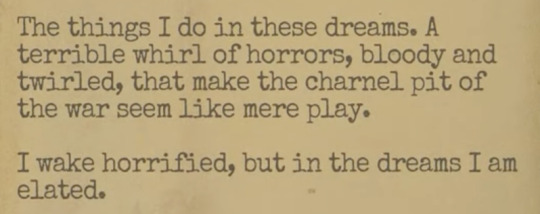

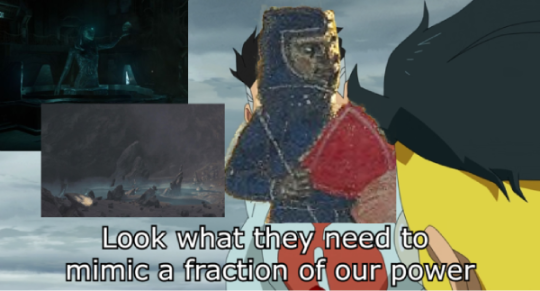
#i'm not putting this in the main tag. lol. lmao#i remember joking with strawberry in their tdd stream about how daniel needs no juice to essentially become a harvester#shoutout to the 10-13th c. upper military class for easily beating him out tho in being Absolute Fucking Freaks™ 👍#(although Bertran de Born is bit notorious in general for being on the extreme end of that spectrum to be fair)#The Poems of the Troubadour Betran de Born ed. Paden Jr.‚ Sankovitch‚ and Stäblein
5 notes
·
View notes
Text

"Monument à Bertran de Born" bronze Pax Fortier (1927) dans le "Parc Gameson" à Périgueux, octobre 2024.
2 notes
·
View notes
Text
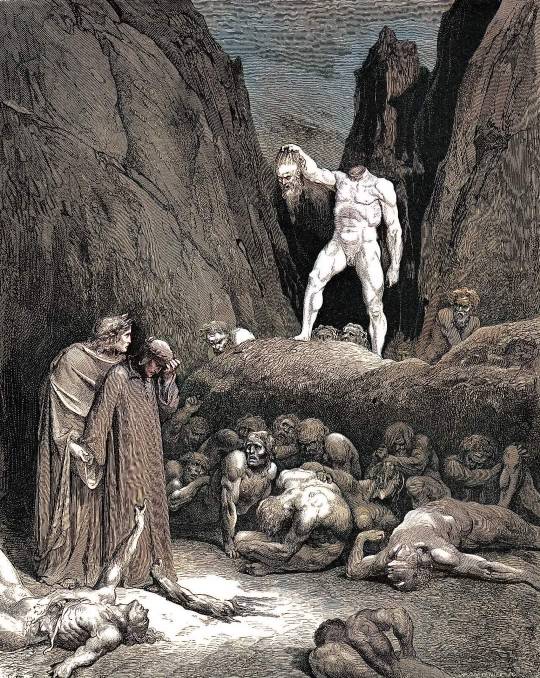
Inferno Canto 28, Bertran de Born Holding His Severed Head - Gustave Doré, 1866.
4 notes
·
View notes
Text
You know, now I kinda want to make a list of every individually identified character in Hell. Circle by circle, counting only human damned souls (* marks people that are said to be destined for that circle):
Antinferno, the neutrals Unnamed figure traditionally identified with Pope Celestine V (Italian)
Circle I or Limbo, the virtuous pagans Ooh boy. Virgil, Horace, Ovid, Lucan, Julius Caesar, Lucius Brutus, Lucretia, Julia, Martia, Cornelia, Cicero, Linus(ancient Romans, I guess you could consider them Italians) Camilla, Latinus, Lavinia (pre-Roman Italians) Homer, Electra, Aristoteles, Socrates, Plato, Democritus, Diogenes, Anaxagoras, Thales, Empedocles, Heraclitus, Zeno, Dioscorides, Orpheus, Euclid, Ptolemy, Hippocrates, Galen (Greeks) Hector, Aeneas, Penthesilea (Trojans) Saladin (Kurdish) Seneca (Hispanic) Avicenna (Persian) Averroes (Arab)
Circle II, the lustful Semiramis (Babylonian) Dido (Carthaginian) Cleopatras, Helen, Achilles (Greek) Paris (Trojan) Tristan (Cornish) Paolo Malatesta, Francesca da Rimini (Italian)
Circle III, the gluttonous "Ciacco" ("hog") (Italian)
Circle IV, the greedy and the spendthrifts (none named)
Circle V, the wrathful and the slothful Filippo Argenti (Italian)
Circle VI, the heretics Farinata degli Uberti, Cavalcante dei Cavalcanti, Ottaviano degli Ubaldini (Italian) Frederick II Hohenstaufen (German)
Circle VII/1, the murderers robbers, and tyrants Alexander [the Great, or of Thessaly], Dionysius of Syracuse, Pyrrhus (Greek) Sextus Pompeus (Roman) Ezzelino da Romano, Obizzo d'Este, Riniero da Corneto, Riniero de' Pazzi (Italian) Guy de Montfort (English) Attila (Hunnish)
Circle VII/2, the suicides and wasters Pier delle Vigne, Lano da Siena, Jacopo da Sant'Andrea, unnamed Florentine (Italian)
Circle VII/3, the blasphemers, sodomites, and usurers Capaneus (Greek) Brunetto Latini, Francesco d'Accorso, Andrea de' Mozzi, Guido Guerra, Tegghiaio Aldobrandi, Iacopo Rusticucci, member of family Gianfigliazzi, member of family Obriachi, Reginaldo Scrovegni, *Vitaliano del Dente, *Giovanni di Buiamonte (Italian) Priscian (North African)
Circle VIII/1, the panderers and seducers Venedico Caccianemico (Italian) Jason (Greek)
Circle VIII/2, the flatterers Alessio Interminelli (Italian) Thais (Greek)
Circle VIII/3, the simoniacs Pope Nicholas III, *Pope Boniface VIII (Italian) *Pope Clement V (French)
Circle VIII/4, the witches and fortunetellers Amphiaraus, Tiresias, Manto, Euripylus, Calchas (Greek) Aruns (Etruscan) Michael Scot (Scottish) Guido Bonatti, Benvenuto Asdente (Italian)
Circle VIII/5, the corrupt officials Elder of Santa Zita, frate Gomita, Michele Zanche (Italian, the latter two being Sardinian) John Paul of Navarre (Spanish)
Circle VIII/6, the hypocrites Frate Catalano, frate Loderingo (Italian) Caiaphas (Jewish)
Circle VIII/7, the thieves Vanni Fucci, Cianfa Donati, Agnello Brunelleschi, Buoso Donati, Puccio Sciancato, Fracesco dei Cavalcanti (Italian)
Circle VIII/8, the false advisors Ulysses, Diomedes (Greek) Guido da Montefeltro (Italian)
Circle VIII/9, the sowers of discord Mohammed (Arab) *Fra Dolcino, Pier da Medicina, Mosca dei Lamberti, Geri del Bello (Italian) Curio (Roman) Bertran de Born (English)
Circle VIII/10, the perjurers, forgers, and alchemists Griffolino d'Arezzo, Capocchio da Siena, Gianni Schicchi, Mastro Adamo, Guido Guidi (Italian) Myrrha, Sinon (Greek) Potiphar's wife (Egyptian)
Circle IX/1 or Caina, the traitors of family Count of Mangona 1, count of Mangona 2, Vanni de' Cancellieri, Sassolo Mascheroni, Camicione de' Pazzi, *Carlino de' Pazzi (Italian) Mordred (Welsh) [implicitely, from the place's name: Cain (undefined nationality)]
Circle IX/2 or Antenora, the traitors of homeland Bocca degli Abati, Buoso da Duera, Tesauro dei Beccheria, Gianni dei Soldanieri, Tebaldello Zambrasi, archbishop Ruggieri, count Ugolino (Italian) Ganelon (French) [implicitely, from the place's name: Antenor (Trojan)]
Circle IX/3 or Ptolomaea, the traitors of guests Frate Alberigo, Branca Doria (Italian) [implicitely, from the place's name: Ptolemy XIII (Greek)]
Circle IX/4 or Judecca, the traitors of lords Judas (Jewish) Marcus Brutus, Cassius (Roman)
something ive noticed while reading dantes inferno is that there seems to be a lot of italians in hell
19K notes
·
View notes
Text
="[ Leitura Recomendada -: Canto 28 da Divina Comédia que Aponta Maomé no Inferno ]"=


Canto XXVIII
Vala dos separatistas
Espíritos de Maomé e Bertran de Born
Quem poderia, mesmo fazendo uso da melhor prosa, narrar as cenas de sangue e das feridas, que eu vi naquele triste lugar? Todas as línguas, por certo, estariam falidas, pois nossa memória e nosso vocabulário não são suficientes para compreender tamanha dor. Nem nos campos de batalha das piores guerras se viu tantos corpos estraçalhados, com deformações e feridas tão terríveis, quanto os que povoavam aquela nona vala.
Próximo a nós estava um condenado com as entranhas à vista, rasgado do nariz à garganta e com os intestinos pendurados entre as pernas. Eu o olhava, hesitante, quando ele, me olhando de volta, rasgou o peito com as mãos dizendo:
- Vês, tu, como eu me maltrato? Vês como Maomé e Ali estão desfeitos, gemendo, e todos esses semeadores de discórdias e heresias? Todos aqui são continuamente rasgados, cruelmente, por um diabo que aqui nos tortura eternamente. Em vão saram as feridas, pois logo ele volta e nos dilacera outra vez! - depois me perguntou - E tu, quem és, tentando retardar a tua pena aí sobre a ponte?
- Nem morte ainda o alcançou, nem culpa ordena que ele sofra aqui - respondeu Virgílio -, mas para que ele possa ter esta experiência, eu, que estou morto, devo guiá-lo por todo este inferno de giro em giro. Isto é tão verdadeiro como a minha presença aqui.
Quando ouviram essas palavras, mais de cem almas se aproximaram para me ver, quase esquecendo por um momento o seu intenso sofrimento.
- Diga ao Frei Dolcino - falou Maomé - que ele se abasteça de mantimentos e não saia do seu refúgio nas montanhas, se ele não tiver pressa em me encontrar. Se não tomar esses cuidados, o bispo de Novarra certamente o vencerá!
Depois de falar, Maomé se levantou e saiu. Veio então outro que tinha a garganta furada, o nariz totalmente decepado e apenas uma orelha inteira. Ele se separou do grupo e abriu sua goela vermelha, que falou:
- Ó tu que vi na sua terra latina, lembra-te de Pier de Medicina quando voltares, e avisa a Guido e Angiolello que, se nossa visão é certa, eles serão arrancados do seu barco e afogados perto de Cattólica, por traição de um tirano cruel. Aquele traidor, que só vê por um olho, reina sobre uma cidade que alguém aqui deseja nunca ter visto.
- Quem é aquele que nunca deseja ter visto a cidade onde reina o tirano? - perguntei.
- É este aqui. Mas ele não fala nada! - disse Pier, mostrando um companheiro calado e assustado, cuja boca ele abriu com a mão. - Este homem, no exílio, acabou com as dúvidas de César quando lhe disse: "O homem preparado, quando hesita, perde."
Oh, como ele parecia assustado, com a língua presa na garganta, Cúrio, que antes fora tão grande orador.
Um outro, com ambas mãos truncadas, levantou os cotos no ar, espalhando sangue sobre seu rosto, e gritou:
- Recorda o pobre Mosca, que disse "o que está feito, está feito" que para os toscanos foi semente tosca!
- E para a tua casta será a morte! - respondi-lhe, irritado, e ele, com mais essa ferida, retirou-se.
Continuei a observar a multidão quando vi um corpo que caminhava sem cabeça. Ele segurava sua cabeça pelos cabelos, balançando-a como lanterna. Quando chegou junto da ponte, ergueu alto o braço que a segurava, para que sua fala pudéssemos ouvir melhor:
- Sou Bertran de Bórnio - gritou -, e sofro esta pena monstruosa por ter instigado o jovem rei contra seu pai. Eu pus o pai contra o filho e por ter separado aqueles antes tão unidos, tive o meu cérebro separado do meu tronco. E assim, em mim tu vês, o perfeito contrapasso.
Bertran de Born, condenado a ter a cabeça separada do corpo para sempre, por ter causado a separação de pai e filho. Ilustração de Gustave Doré (séc XIX). "
Até aqui a Transcrição
Luiz Henrique, Rua Senador Bias Fortes 195 , Uberaba, Mg, Brasil.5534992808858 [email protected] e 5534993365153 [email protected]


1 note
·
View note
Text
A memory that I replay to myself...
A stage-actor, I work up a feverish tempo... crying... my audience is led down the depths of the dry well of sorrows...
Suddenly, the actor breaks character and start laughing, nearly on a level of sadism... "LOL! This is the only way I can get myself to cry... Isn't that funny? Isn't that fucked up?"
youtube
The assumption that "a normal person would not feel what I feel" and "if a person feels what I feel, then they are not normal, in fact they are pathological... by my adopted standard of definition."
I feel like I have practiced and trained myself to laugh and cry on command... express emotion, express pathos.... "express your inner goo".
So I was just crying out of genuine sorrow, but then the-other-thought-process started thinking of fucked-up jokes, fucked up self-smirches, so I'm sobbing and laughing like a maniac in rapid cycle. It feels exhausting.
Sorry, I love reframing myself as a freak. I love to dissect myself from context to become a freak. Even in the story, that's exactly what's happening...
what's a sculpture? Something shaped through the removal of matter...
It takes 30 years for a tree to grow this tall and strong, but in five days you could reduce it to rubble. -- a mockery.
"but It's easy to criticize, and it's easier to laugh than cry... and it's easy to do it all again... but I don't know what to say to make you see the sun --- the same Sun... --shining down on me: all right.. --shining down on you: all wrong
lyrics of Something..
"Give a man a mask, and he will show you who he really is..."
...Do you think that to be true, Mr. Will Graham?
After all, they say that the key to intelligent tinkering is to save all the pieces... nevermind all the lifeless organs lying on the tray.
Can I bring it back to life?
Okay, fine, when I'm cutting open your spleen, I'll make sure you're alive and feeling... I'm saving the pieces. I take your constructive criticism.
The relativity of the situation demands it.
WHERE TO, NEXT?
There's another story I heard...
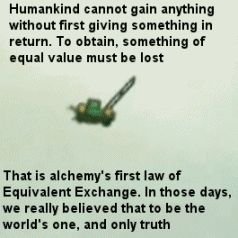
Let’s go back to Bertran de Born. Why was his head cut off? Because he was a schismatic, he set people up against their loved ones. Bertran divided people and now he himself is divided, literally. Bertran embodies his punishment. And this goes for all the sinners who we have met. But the contrapasso is not a simple punishment for making a mistake. The sinners chose to live their lives in the wrong way: they did the wrong things for the wrong reasons. And ultimately this has a consequence, such behavior takes you to the wrong place: inferno. The contrapasso is then really not an punishment by an external judge, a vengeful God. Rather it is the revelation of an inner spiritual condition. After a life of self-creation the inner state of the sinful soul is now externalized into an eternal exemplar.

youtube
"The boy in the belfry, he's crazy --- throwing himself down from the top of the tower. Like a hunchback in heaven, he's been ringing the bells of the church for the last half an hour... and he sounds like he's missing something-or-someone that he knows he can't have... now.. and if he isn't, I certainly am.
I just ask what it means if this sort of emotional-surgery leaves behind scars all the same as a bodily-surgery
(unless the right techniques are employed; unless tension is relieved).
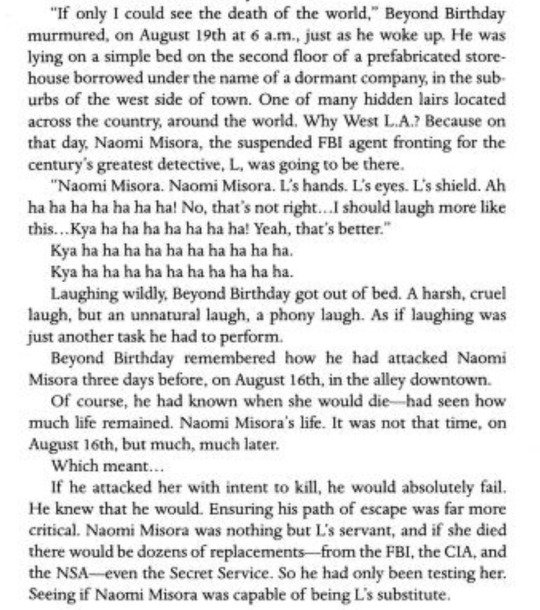

What if the condition of the self-immolator is a revelation of someone who has been doing this to their own mind during their life?
(and if he isn't, I am.)
Is the physical condition a consequence of the spiritual condition?
....to live, covered in scar-tissue and the grafted skin of other people. It hurts. Does it, now?
Are you just crying for sympathy, after the fact?
youtube
0 notes
Text
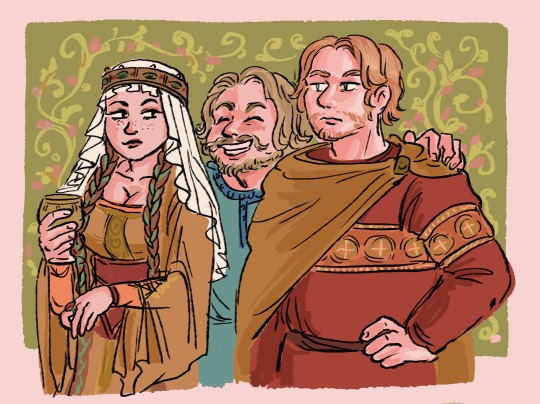

Matilda of Saxony/Bertran de Born/Count Richard
“I wish that Lady loved me, and the Lord of Poitou loved me too!”
#Idk if the quote is real but I like to imagine.#this is in his head btw. He’s not getting laid RIP#Bertran de born#troubadour sandwich#Richard the lionheart#Matilda of Saxony#angevins#12th century#medieval#my art#happy new year!
16 notes
·
View notes
Text
Inferno XXVIII
Impegni rispettati. La giornata si chiude mentre rimugino sul XXVIII canto. Qui entrano in gioco i servi più fedeli del male.. coloro che 'dividono'.
Dia-ballein.. "mettersi in mezzo".. Seperare... l'uomo da Dio, gli uomini fra loro, la vita di noi tutti tra desideri bassi e aspirazioni alte...
Due punti:
1) le ferite, i corpi straziati.. ribaltamento dell'iconografia dei martiri cristiani... lì dove sono segno di Testimonianza.. un indicare una 'Vetta' per la quale si può sopportare di tutto.. qui in questa bolgia diventano punizione eterna.. il tempo di guarire e nuovamente viene straziato, senza alcun senso. Un dolore per il dolore.
2) la vicenda di Bertran de Born.. la testa mozzata.. la testa lontana dal cuore.. la seperazione - ancora! - fra pensiero e cuore... ."ed erano due in uno e uno in due". L'Unità è andata. LA divisione per eccellenza.. quella NELLA persona: i risultati? Discordia e lotta, in sé e fuori. Nella società.
.
0 notes
Text
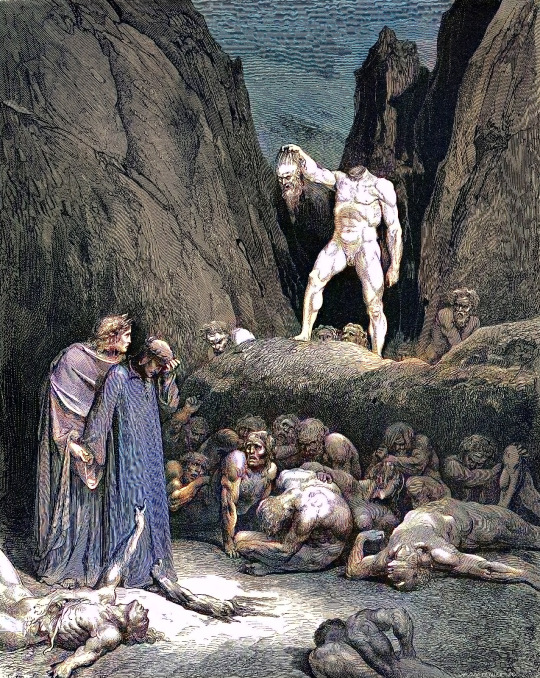
Bertran de Born from Dante's Inferno, Canto 28, illustrated by Gustave Doré
Dante shields his face from the horrifying appearance of Bertran de Born, who allegedly fermented the rebellion between Henry III and his father, King Henry II. His brain has been severed from his body even as he severed the relationship between father and son. The engraver, Auguste Pontenier (1820-1888), has placed his signature at the bottom right, while the artist Gustave Doré (1832-1888) has placed his signature at the bottom left.
#bertran de born#dante alighieri#virgil#inferno#art#hell#the divine comedy#divine comedy#gustave doré#auguste pontenier#illustration#history#europe#european#medieval#middle ages#renaissance#troubadour
252 notes
·
View notes
Video
youtube
Bertran de Born - Ensenhas -
Pois als baros
3 notes
·
View notes
Text
hunting down this post again to say: mikuni being part of the 8th circle of hell instead of the 9th circle makes me think of this





if he was a sower of scandal instead of a traitor, then this conversation implies that mikuni's goal might be aligned with the rest of the team. for a beautiful world, for peace and justice, but he doesn't believe that kind of thing can be achieved without sacrifices
i think the comparison to Bertran de Born makes sense however what really sold me to the idea that Mikuni isn't a traitor is actually

the fact that Cocytus, the ninth circle in Dante's Inferno, is already used as a spell name for Gluttony Pair instead, despite the first round which is reserved to punish those who betrayed their blood family is named after Cain
Alicein Mikuni, Sower of Scandal
So, @yarrayora brought up the concept of cephalophore in connection with Mikuni and Lily’s little stunt in the most recent chapter. I was intrigued, so I went down the rabbit hole to see what this could mean.
Warning: servamp spoilers and slight gore
Keep reading
#servamp#servamp analysis#listen. LISTEN. in freya's introduction she said she owns an apple orchard#and then her eve is a girl named IDUNA#i believe in tanaka strike's foreshadowing#servamp theory
78 notes
·
View notes